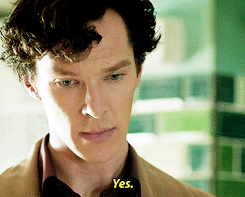The conversation went something like this:
Me: I suck at blogging.
RW: You don't suck at blogging. Your posts are generally good. What you suck at is planning what to write. (*this is true)
Me: No, I really do suck at blogging. And planning.
 |
| (even Sherlock agrees) |
RW: Wait, I know. Have you done a post about writing a series yet? (*because I write a lot of series)
Me: And what would I say about writing a series?
RW: How did you maintain the continuity between the historical western books? Was it different from how you approached the sequel to Hunter's book? Is contemporary easier than historical? How do you keep track of things? Pinterest boards? Google docs? Have you ever had a reader (beta or otherwise) catch a continuity error? What'll you do to keep that from happening? Are there any sources for "how to write a series" that you've found particularly helpful? From an agent's perspective/your knowledge of the industry, what are the pros and cons of writing books in series? What's your best piece of advice for a newby starting out with a series?
Me: Oh wow. Okay, so my answer to all that is...I didn't plan that far ahead (big shock, right?). I did it all as I went. Oh, and Google.
RW: ...
Me: My post can consist of this: How to Write a Series, by M. Madigan. Come up with a fabulous idea (or you hope it is. It sounds fabulous in your head at least). Make a page of general notes (It's contemporary/western/post-apocalyptic and there are maybe five core characters you'll focus on for the series). Make more specific notes for book one. Start writing. Worship Google. Start the next book by making specific notes. Shoe-horn it into the series to fit with book one. Lots more Google worshipping. Do the same for the rest of the books. The End.
RW: Um. Don't forget gifs.
 |
That's how the conversation went, but I'm being (mostly) facetious about the process (okay, only partly). Everyone who writes a series will have a different process, so mine is just mine and could probably stand to be improved upon.
However, how do you write a series is a legitimate question because in many genres (romance, mystery, scifi, fantasy), series are hot. Readers want them, agents and editors look for them, so writers need to think about writing them.
I seem to be a series addict. I've got no fewer than eight in progress at the moment: the Nevada Bounty series (historical romance), the Caine Brothers series (erotic contemporary novellas), the Forever Faerie series (paranormal romance), the Tap Zone series (contemporary MMA romance), the Dragon Club (shifter romances), Never Too Late (second chance at romance/women's fiction), the Timed Out series (space opera), and the Tales from Beyond the End (post-apocalyptic fairy tale retellings).
 |
| (that's a lot of series) |
Why do I write series? Because I like to set up a world, fill it with people, get to know them and then put them through the wringer. I think that's why readers like them, too. I know that's what I like when I'm reading them, so that's what I aim for as a writer.
But how do you write a series? I can give you some idea of how I do it, but again, all writers are different. I write romance and science fiction so I can get away with some loosey-gooseyness where authors of mystery and fantasy probably can't. Those genres require some pretty tight plotting and planning.
So although I was being snarky when I said this is what my post would look like, in the end, it kind of does:
How to Write a Series, by M. Madigan
1. I'm struck by a fabulous idea for a series. Often when this happens, I'll brainstorm with another writer friend just to be sure the story idea sounds as good out loud as it does in my head. I also look at some of the stuff that's selling in the industry to see if the idea has merit. If it has potential to sell (for instance, if I came up with an idea for a vampire/angel/demon romance, even if it was amazing, I wouldn't write it because that stuff is dead right now. It'll come back around again eventually, but I don't want to spend time now on something I can't sell), I'll move on to step two.
2. Make a page of notes for the series. What's the genre? Who are the characters? When I came up with the idea for the Caine Brothers series, I immediately sat down and made some general notes for each brother - his name, what he does (billionaire, biker, SEAL, rock star, fighter, shifter), who his heroine is, and a short paragraph blurb for the plot. All these things are subject to change, but the notes give me a vague shape for the series.
3. Make more specific notes for book one. I'm not a detailed plotter, but I do want notes to work from. I don't like writing myself into corners (I did this with the space opera and it took me a long time and some rewriting to get out). I do a character profile for the main characters, a setting worksheet, and write a couple of pages of linear plot summary. Often I will expand these as I'm writing and need more detail. I also make note of important details like dates, quirks, props, secondary characters, relatives, etc...anything that can be used throughout the series to tie them together. I love Pinterest as a visual way to keep track of characters, setting, props, clothes, etc. I have Pinterest boards for each book and/or series. Google is also my friend. I never know what kind of research I'll need until I'm deep into the story, so sometimes there's a lot of stopping-digging-starting going on. Writing a historical western required some pretty interesting research (for instance, 19th century western curse words). One of the great things about being a writer (I think) is that I get to teach myself about a whole bunch of new stuff that I probably never would have learned had I not needed to research it for a book!
Once the first book is done (after I've had my awesome betas read it--and yes, they've caught stuff I didn't see like continuity things, improbabilities, practical problems) and off to an editor, or self-published, it's time to move on to the next one.
4. Start the next book by making specific notes. Repeat the process with the next book. I go back and look at my series notes, figure out who's next, what the general plot is about, then open a document to begin expanding that into a fleshed-out plot. I'll review my notes from book one to see what I need to carry over (themes, tropes, etc), and get to work on the next one following the same general writing process. I kid when I say I have to "shoe-horn it into the series to fit with book one" because although I don't have obsessively detailed series notes, I hope they're good enough I don't have to force anything. And if I come across a problem, I just see that as an opportunity for creative solutions.
5. Repeat the process for as many books as are in the series.
For me, that's it. That's the process. It's part organic, part planning, part linear, part disorder, often frustrating, but always a wonderful, juicy, creative, wild ride!
The point is, if you write series you need to find what process works best for you depending on what genre you write, but also what kind of writer you are. There's no right or wrong as long as you figure out some form of organization and creative process that works to maintain your continuity and inspiration.
 |
| (use yours) |
Now, go write.
~Margaret

My process involves a bunch of giant post-it notes all over the walls of my office. It's quickly becoming 'papered', but I don't mind. I like that when something comes to me, I just take a pencil to the wall and start writing. It's usually something for a book so far into the series, I'll be lucky if I can get to it in 2017. Nice blog! I love hearing how other authors' processes work.
ReplyDeleteIt's funny how some things I want on paper and some things must be in a Word document. I don't think I could do notes all over the wall...but that's what makes writing great. Every author does it differently!
DeleteI feel I should comment on this somehow, but you took the words right out of my mouth.
ReplyDelete;)
Literally.
Delete